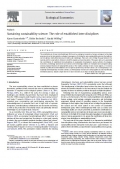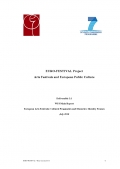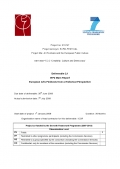Uploaded by Ivan Montenegro Perini 5154 days ago Number of pages: 214 File's language: English Views: 2065
This report is the second main deliverable of the EURO-FESTIVAL project on „European Arts Festivals and Public Culture‟.
The EURO-FESTIVAL project is a contribution to the comparative cultural sociology of contemporary European society. Its aim is to examine the role of festivals as sites of trans-national identifications and democratic debate. The project answers to the terms of reference of task 5.2.2 of the Social Sciences and Humanities (SSH) Programme of the 7th RTD Framework Programme (7FP). Task 5.2.2 is concerned with the origins, role and impact of creativity, „especially in the context of literature and the arts‟ (SSH Work Programme, p.29) and the role of the latter „in influencing democratic debate‟ (ibid.)
An essential feature of democracy is debate. This has often been related to the notion of the public sphere (Calhoun 1992, Habermas 1996, Giorgi et al. 2006). A much neglected aspect of this is the aesthetic public sphere or aesthetic public culture. Unlike other social and cultural institutions such as „the church‟ (religion), „the school‟ (education) or „the community centre‟ (the local) that have been widely explored in democratic terms as sites of both identity formation and/or discursive practice, the aesthetic public culture comprising artistic expressions and performances has received little attention from this angle. This is probably because culture and the arts were – and often still are – considered primarily as depictions of social reality. The recognition that they are autonomous social fields (and to be treated as such by social theory and empirical investigation) is long-established in cultural sociology but not as yet in democratic studies. If however, following Chaney (2002) we acknowledge that „cultural objects of performance are shifting from functioning as representations or depictions of social life to constituting the contexts or terms of everyday life‟ (p.163), their exploration as public spaces and constituent elements of the democratic public sphere becomes imperative.
The overall aim of the project is to analyze the way in which mixed- or single-arts festivals constitute sites of cultural expression and performance of relevance for European identity-in-the-making and for the European public sphere. More specifically, the project objectives are to:
- Explore how festivals use aesthetic forms to symbolize, represent and communicate social and political life from the perspective of different actors, including programme directors, funding promoters, performing artists and the audience.
- Study the way in which festivals frame the discourse of identity in relation to arts with particular attention to the local / national / supra-national and local / global interfaces as well as conundrum of difference (diversity) and similarity.
- Analyze how festivals represent sites of competition for access to resources, status and power and how this competition impacts on debates about representation, openness and the public sphere.
- to explore how and why arts have come to be associated with festivals in the first place, and
- to trace how specific festivals developed over time.
 Youth, Unemployment, and Exclusion in Europe: A Multidimensional Approach to Understanding the Conditions and Prospects for Social and Political Integration of Young Unemployed
Youth, Unemployment, and Exclusion in Europe: A Multidimensional Approach to Understanding the Conditions and Prospects for Social and Political Integration of Young Unemployed Climate change, hydro-conflicts and human security: Achievements of and Gaps in current policies
Climate change, hydro-conflicts and human security: Achievements of and Gaps in current policies Sustaining sustainability science: The role of established inter-disciplines
Sustaining sustainability science: The role of established inter-disciplines European Arts Festivals: Cultural Pragmatics and Discursive Identity Frames
European Arts Festivals: Cultural Pragmatics and Discursive Identity Frames European Arts Festivals from a Historical Perspective
European Arts Festivals from a Historical Perspective European Public Culture and Aesthetic Cosmopolitanism
European Public Culture and Aesthetic Cosmopolitanism
iKNOW has been featured in the media and several research projects:
DIE ZEIT (Germany), Financial Times (Germany), El Heraldo (Colombia), Prospective Foresight Network (France), Nationalencyklopedin (Sweden), EFP - European Foresight Platform (EC), EULAKS - European Union & Latin America Knowledge Society (EC), CfWI - Centre for Workforce Intellience (UK), INFU - Innovation Futures (EC), Towards A Future Internet (EC), dstl - Defence S&T Laboratory (UK), EFSA - European Food Safety Agency (EU), Malaysia Foresight Programme (Malaysia), Bulletins Electroniques more...
